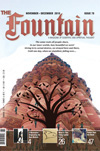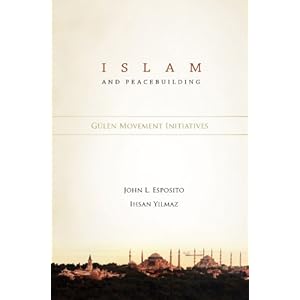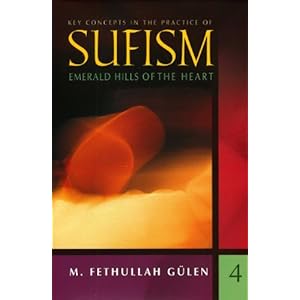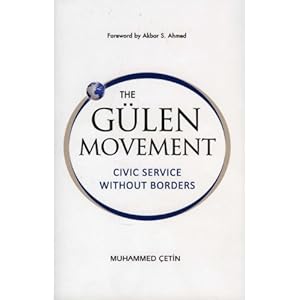Below is a preview to an article by Fethullah Gulen that will go to print in the February 2011 issue of The Fountain Magazine. It summarizes, for the many volunteers, the sentiments they carry as they play a role in the global civic and social movement known as the
Hizmet (Service) Movement (aka the
Gulen Movement)
A Movement Originating Its Own Models
M. Fethullah GULEN, The Fountain Magazine, February 2011

In this article I would like to discuss a legend; to talk about it is a duty, and therefore it is difficult to put it into words. However, I wonder if it is possible to describe in the scope of such an article an important resurrectional movement, a movement that has thrived in every part of the world, budding, giving off shoots and seedlings. I think not. What I know about the issue comes only from the videos I have seen. My attestation relies on what I have heard. The limits of my pen are those of my comprehension. I do not know to what era the implication of all that has been happening belongs. Now tell me what can be told under these circumstances. All I can do in describing this will be like someone attempting to describe roses and flowers as they really are after only seeing a picture of a rose or a flower. But my task resembles more an attempt to describe the unique pattern, accent, and manner of each flower and rose in a garden by merely looking at the picture of a dead rose; the rose garden nor the flower garden cannot be described in this way. Even so, I believe that one should dare to talk on behalf of the phenomenon of the era to galvanize people of letters and conscience. If some people close to God will be inspired as a result of this article, I think then that my aim has been achieved.
No matter how expressive and stylishly it is told, what matters is that this important phenomenon of the era should be related. It should, after all, be related so that we add a footnote to history and show our respect for those devoted people who performed such heroic deeds. If, on the other hand, this soft breeze, this warm atmosphere, this fresh thought and this love, and the gentle winds felt across the globe were to be described very briefly, it would be disrespectful toward the noble traits, such as magnanimity and altruism.
This movement is a phenomenon to be written about and underscored. A few dozen passionate people set off in all directions for the sake of God without stopping to think about their longings or their feelings of separation and without uttering the words “foreign lands” or “unknown places” at a time when nobody could even fathom what lay ahead. They were full of determination, firm of intention, and self-reliant. They suppressed their love for their country and their homeland, replacing it with a love for mission. They were aware of their efforts for the cause of God as few have been, they lived as such, and they walked to the east and to the west saying:
We have entered the path of love,
We are lovesick.
Nigari
At the most colorful period of their lives, when worldly pleasures and material objectives attract young people with an irresistible lure, and when physicality oppresses the hearts and minds of a person, they virtually flew to all these places with a passion for accomplishment that suppressed the various desires and compulsions; the excitement of those in the first row was in their hearts. This flight abroad was not like the departure of lovelorn youths who chased a false siren that had entered their lives at an unlucky time, those youths who pursued their dreams for a lifetime, who became lovesick, and who were strangers to their own nature, yet unable to reach the desired goal. The mission of these youths was from the heart and based on emotions, on consciousness, and determination; it had a depth of good faith and sincerity. You could say that these were the usual dynamics of faith, the natural conditions of divine ambition, the ideals of the devoted, the guides of the Infinite Light, or the efforts of those who had abandoned their selves and their beloved ones in order to express themselves. Indeed, they were neither prevented by their own shortcomings nor did they surrender to the obstacles in their way; they walked to the far corners of the world, the only never-fading love in their hearts being God’s favor and the ambition to meet Him. They walked; the roads took pride in this, the angels cheered them on, and, naturally, the devils beat their breasts. They walked; they had neither horses nor cars, nor weapons, nor ammunition. Their source of energy was their incredible faith and the excitement in their hearts that seethed like magma; on the horizon was the happiness of humanity, consent, and pleasure. Their destiny equaled that of the Companions and the Apostles. Soon after dawn they attained, with their chastity and purity, a manner that was tantamount to kinship with the angels. They became a theme for legends and a thing of never fading memory. They brought streams of light from eternity wherever they went. They lit a fire all around; the flame, ember, and smoke of this fire was happiness. The spell of tyranny and darkness gave way. The disbelieving bats were deprived of their sleep, and darkness unceasingly grumbled. Lies, calumny, and intrigue were hindered once again. All this made boorish thoughts and bigotry intolerably arrogant, making it want to tread on others’ ideas and set up traps for faith. However, all opposition was in vain: the light shone everywhere. The light that radiated from eternity embraced the entire world. Now it was the time and the epoch of the bright souls, although the murky situation still prevailed and the horizons were foggy, but the magic of darkness and the boorish thoughts were already undone.
Now it was the turn of the bright souls to speak. Humanity would discover itself through them and take its true place in the hierarchy of creation. Therefore, it was a generation that had long been awaited. As people had been waiting for them, wherever they went they always bent double as a consequence of their reverence for God and their respect for humanity, their eyes fixed on the doorway of the Most Gracious, meekly and humbly, awaiting the time when showers of light would be unleashed, while their heads and feet touched the ground. No matter how the people of today assess the issue, these were the children of tomorrow; the bright future bore their secrets. These lucky people, who were the apostles of resurrection, each in their own way, held the flowers of friendship in their hands and the verses of brother and sisterhood on their lips. Their tongues, sharper than sharpest swords, were nourished by Qur’anic waterfalls and their words had divine dimensions. These words destroyed darkness, but did not harm anyone. They brought the sound of the rivers of Paradise within earshot, but they did not lead to a longing for Paradise. In fact, these people needed neither hands nor tongues. Their pure faces that reminded one of God wherever seen were so magical that words stumbled in the presence of the meanings that emanated from their manners, and tongues became mute. Even their shadows burned the night moths; not to mention their light, which dazzled anyone that came near. We rightfully say, “Tongues and words have nothing to say in the presence of actions. When manners speak, is there a need for speech?” They are the representatives of this truth. There have always been multitudes of good people on the Earth; however, the manners and words of this latest group are entirely different. I can hardly say that they were singular or unique, but were I asked to explain how they were, I would not be able to immediately reply. I would probably say, “They look like angels,” and give up there.
Wherever these bright souls go, dry deserts turned into gardens of Eden thanks to the light they radiated. Much coal has been transformed into diamonds. Natures made of mud and stone have ascended to the rank of gold and silver. And everybody is talking about them now, waiting for the days when the love, brotherhood, and tolerance they promised will be realized. Today, only those who confuse darkness and light and who spend their lives in the realm of physicality are speaking against them. The bats are uneasy. The wolves and jackals are baring their teeth. The fools are restless. I find all these natural, and say, “Everybody exhibits his or her true nature.”
Whatever happens, despite those who blow out the candles, these men and women have long illuminated the hearts that are thirsty for light wherever they go, they warn the pure natures of what lies behind things and events, and they announce the universal human values to unspoiled souls.
I firmly believe that, just as intercontinental obstacles were once overcome thanks to the Qur’an, and love, respect, and dialogue were permanently established, a new ground for reconciliation has been or will be founded by the efforts of these lucky people today. Humanity used to recognize our nation, with its smiling face and fortunate destiny. Why should this very fact not also be true today? A flood of love among the people has started overflowing in almost every place that these bearers of the mission visit. There have been breezes of happiness and gladness, one after another, that can be felt all around. Moreover, islands of peace, which we can call invulnerable castles of harmony and stability, are forming near and far.
Who knows, maybe in the near future, thanks to these volunteers who devote themselves to letting others live, the mind and soul will embrace each other once again; conscience and logic will become complementary depths of each other; physics and metaphysics will stop fighting and withdraw to their own realms, and everything will find the opportunity to express the beauty in its own nature through its own language, the intricacy of legislative rules and the principles of creation will be rediscovered, people will regret having fought each other over nothing, an atmosphere of peace that was not previously established in the marketplaces, in the schools and homes will be established, and breezes of happiness will blow, chastity will not be violated, honesty will not be oppressed, hearts will always breathe respect and esteem, no one will envy others, their property or their reputation, the powerful will treat the weak justly, the weak and the poor will have the chance to live humanely, nobody will be arrested on the strength of mere suspicions, no dwelling or workplace will be raided, nobody’s blood will be shed and the weak will not cry, everybody will adore God and love humanity. It is only then that this world, which is the hallway to Paradise, will become an Eden that is fascinating to live in.
see also:
Fethullah Gulen: Following in the Footsteps of Rumi by Thomas Michel
SEE ALSO BELOW ARTICLES BY FETHULLAH GULEN
The Necessity of Interfaith Dialogue
Mevlana Jalal al-Din Rumi
Sufism And Its Origins
Notes
1. The author has dedicated this article to countless educational activists who have gone all around the world, with a motivation to provide quality education and to promote peace between different nations and cultures. All throughout his life and career Gülen has preached the importance of education and directed his audience to participate in and support educational activities.
2. Seyyid Nigari: A famous poet of Azerbaijan. He was an important representative of nineteenth
century mystical poetry.







